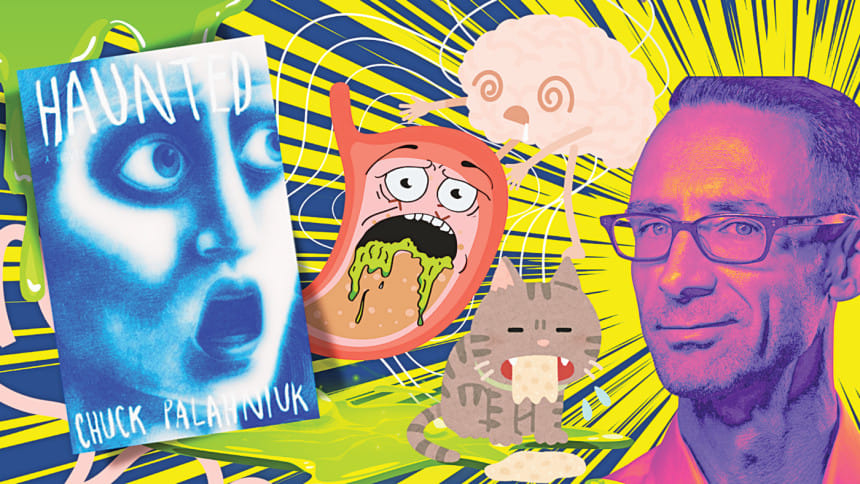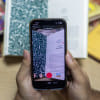Panic, puke and Palahniuk

October 30, 2003, Chuck Palahniuk sits across Conan O'Brien on his late-night talk-show to promote his new novel, Diary (Doubleday, 2003), but the conversation is steered to something else that happened earlier over the summer. Palahniuk, in his Armani water buffalo leather pants, leans forward, more than eager to elaborate, and starts recounting an event at Columbia University that took place during one of his readings: "… This man falls backwards, falls forwards, falls on the floor, vomits, starts to aspirate his vomit, starts to bark like a dog while he's passed out, at that point, the publishing people come to the foot of the stage and they say, 'uh—Chuck? Over here. Do not read another word of this story, go right to Q&A, you've done enough damage.'" The late-night crowd gasps predictably, and Conan wants to know what kind of stories is Palahniuk specifically reading that is causing this visceral reaction? And Palahniuk replies, "It's a funny story about three ways that masturbation can go wrong." The crowd keels with laughter this time.
That is the story that started it all: "Guts". A short story included in his full-length 2005 novel, Haunted (Doubleday), which follows 17 aspiring writers responding to an advertisement of a secluded three-month writers' retreat. But Palahniuk was already performing live readings of this specific story, two full years before the book would come out, as part of his press tour for his other novel, Diary. An unexpected wave of fainting spells, vomiting episodes followed. As audience members bolted for the exits, and Palahniuk proudly tallied up these numbers as though he were racking up horror movie kills—it all culminated into something that read like Reddit creepypastas long before that had become a thing. It was marketing gold, a pure moment of viral horror before "viral" had also become a thing.
Now, two decades later, the question lingers: Did "Guts" really cause waves of fainting spells, or did the legend grow legs of its own?
"Guts" was actually formulated after one of Palahniuk's sessions at a support group for sex-addicts. Funnily, he wasn't there to collect material for Haunted, but Choke instead, a 2001 novel about a man who fakes choking in restaurants and attends similar support groups. But it was at one of these meetings where some of the personal stories shared were so extreme and graphic that it inspired him to collect similar tales for what would end up becoming this infamous short story.
20 years later, Haunted as a book, is remembered less for its themes of fame, exploitation and the cult of suffering, and more for whatever panic and puke-induced entrails "Guts" left behind.
It really makes sense that Palahniuk was the author who needed to have paramedics on call during his live readings.
"Guts" was one of the more gut-wrenching (pun fully intended) stories in Haunted, told in the deadpan confessional tone Palahniuk is famously known for. It is a twisted tale of self-pleasuring accidents gone grotesquely wrong—complete with pool drains, candle wax, and vegetables used in anatomically unapproved and deplorable ways. The book contained 23 short stories in total, all similarly grotesque in varying degrees, but few have reached infamy the same way "Guts" has, if at all. From crowded bookstores to crowded university auditoriums, Palahniuk watched as audience members dropped like flies. The count went from single to double digits, and ultimately reached legend status.
And as word got around, it didn't take long for the skeptics to chime in: How much of it was manufactured? Some eyewitnesses from those tours talk about it being purely circumstantial—one lightheaded individual who couldn't handle the heat and the crowd, it just happened to be a Chuck Palahniuk reading where they blacked out. Some think it might have initially been one single person who didn't have the best reaction, and through word of mouth, in an age where the internet wasn't still as massively accessible, the whole ordeal must have turned into this horrible game of Chinese whisper, and as misinformation carried it must have turned into some kind of a group delusion.
Besides, no one has ever contested that Palahniuk is a master when it comes to inducing queasiness, and the human body is extremely suggestible, after all. Now add in the theatrics of live readings and getting to meet one of your favorite authors, plus the anxiety of audience expectation, and a strange, subconscious urge to perform while everyone around you is whispering about some online posts from a fan forum where people had been boasting about surviving the "Guts" reading—you have a recipe for disaster. Whether that was 67 people or just six of them, people did faint, and they did throw up. In fact, remember the interview excerpt from before? If you are interested in a visual account, there is evidence of that. A 2003 documentary titled Postcards from the Future: The Chuck Palahniuk Documentary, which includes footage of a young man at Columbia University falling forwards and then backwards and then aspirating in his own vomit. And then there is the infamous Pitt News article by Jonathan Check, the University of Pittsburgh's daily student paper, where the author started his piece with the line: "They came, they heard, they threw up".
In subsequent years, with the consequent rise of forums like Reddit and Palahniuk's personal (currently defunct) fan site, The Cult, it started to take the form of a dare—could you stomach "Guts"? Readers had begun to challenge each other; wide-eyed hushes of previous body counts and a wave of shock that felt both like a personal high and a communal hug. The experience had become more about reacting to the reading and then sharing the reaction, in an age where book tours themselves have become less frequent.
In the end we are left with some uncomfortable questions: considering how this was, after all, a marketing ploy—is it not just a tiny bit sleazy that it was built on legitimate audience trauma that got turned into an exaggerated narrative that was purely curated for buzz and sales? Why would Palahniuk keep doing it, until 67 people fainted and got sick? Why did his publishers allow this? Sure, Chuck has never shied away from provocation but doesn't something about this still feel a little nasty? But then again, some would argue that the audience demanded it, people showed up in droves desperate to throw up at the Chuck Palahniuk "Guts" reading and he was just appeasing his fans. Wasn't he? He just exposed the lengths of sensationalism, an era of people desperate to push boundaries. Weren't these the same groups of people lurking behind Ogrish.com and LiveLeak URLs, after all?
I was too busy being three years old when the Pitt News article first came out. My acquaintance with "Guts" is fairly recent. I started the book in 2022, and it took me quite a while to get through all of it. That same year, "Guts" had a resurgence on BookTok and many videos of people "live-reacting" as they read the piece with flashy titles like: "This has to be the grossest book I've ever read".
20 years later, Haunted as a book, is remembered less for its themes of fame, exploitation and the cult of suffering, and more for whatever panic and puke-induced entrails "Guts" left behind. But considering the iconography of Chuck Palahniuk, especially in terms of provocation, somehow, the lasting legacy of "Guts" is rather fitting. 20 years later, the story of "Guts" seems to have carved out a peculiar niche in the pop-culture hall of fame for years to come.
Arshi Ibsan Radifah is a Literature major who loves unreliable narrators and Wes Anderson movie sets. If she had it her way she would have liked to play bass for a girl band in the 90s, but for now she'll suffice by rewatching Empire Records.

 For all latest news, follow The Daily Star's Google News channel.
For all latest news, follow The Daily Star's Google News channel. 








Comments